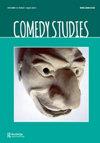Laughing behind bars: How stand-up comedy by people with lived experience of incarceration confronts and sustains stigma and marginalization
Q1 Arts and Humanities
引用次数: 1
Abstract
Abstract Stand-up comedians provide insight into human positionalities, offer poignant social critiques, and can bring sensitive and uncomfortable subjects to the forefront of public discourse, including discussions around mental illness. Historically, however, the industry has relied on the stigmatization and marginalization of Others. Jokes about criminality, arrests, and incarceration are widespread across stand-up and other entertainment mediums, though often narrowly focused on individual behavior; these jokes fail to account for the known correlates of crime, which include economic vulnerability, un- and under-employment, and mental illness. More often than not, this humour fails to account for underlying socio-political, historical, and structural forces linked to carceral inequities, such as heteropatriarchy, Eurocentrism, and the historic and ongoing impacts of colonialism, dispossession, and slavery on health, social and criminal justice inequities, including mental health. In this context, comedians with lived experience of incarceration offer unique perspectives into the prison industrial complex and the impacts of incarceration on mental health and wellbeing. In this paper, we explore the work of comedians with lived experience of incarceration, highlighting the ways that comedy provides opportunities to confront pervasive stereotypes around incarceration and mental illness, while industry norms continue to sustain stigma, homophobia, and neoliberalism, and obscure systemic forces linked to carceral inequities.监狱里的笑声:有监禁经历的人的单口喜剧如何面对并维持耻辱和边缘化
摘要单口相声演员能够洞察人类的处境,提出尖锐的社会批评,并能将敏感和不舒服的话题带到公共话语的前沿,包括围绕精神疾病的讨论。然而,从历史上看,该行业一直依赖于对他人的污名化和边缘化。关于犯罪、逮捕和监禁的笑话在单口相声和其他娱乐媒体中很普遍,尽管通常只关注个人行为;这些笑话没有说明已知的犯罪相关因素,包括经济脆弱性、失业和就业不足以及精神疾病。这种幽默往往无法解释与肉体不平等相关的潜在社会政治、历史和结构力量,如异父权制、欧洲中心主义,以及殖民主义、剥夺财产和奴隶制对健康、社会和刑事司法不平等(包括心理健康)的历史和持续影响。在这种背景下,有监禁经历的喜剧演员对监狱工业综合体以及监禁对心理健康和幸福的影响提供了独特的视角。在这篇论文中,我们探讨了有监禁经历的喜剧演员的工作,强调了喜剧提供了对抗监禁和精神疾病普遍存在的刻板印象的机会,而行业规范继续维持污名化、恐同和新自由主义,以及掩盖与尸体不平等有关的系统性力量。
本文章由计算机程序翻译,如有差异,请以英文原文为准。
求助全文
约1分钟内获得全文
求助全文
来源期刊

Comedy Studies
Arts and Humanities-Literature and Literary Theory
CiteScore
0.60
自引率
0.00%
发文量
26
 求助内容:
求助内容: 应助结果提醒方式:
应助结果提醒方式:


